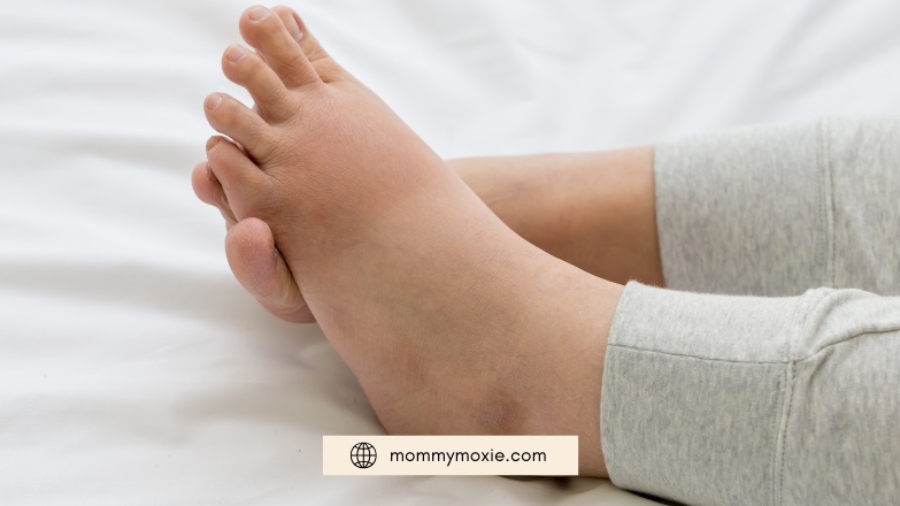Swollen feet are a common issue during pregnancy. They cause discomfort and worry.
Pregnancy brings many changes to a woman’s body. Swollen feet, or edema, is one such change. This condition is often due to the extra fluid and blood needed to support the baby. It can be uncomfortable, but there are ways to find relief.
Understanding why this happens is the first step. Taking action can help manage the swelling and improve comfort. This blog will explore various remedies and relief options. It aims to provide practical tips for expectant mothers. So, let’s dive into how you can deal with swollen feet during pregnancy effectively.
Causes Of Swollen Feet
Swollen feet are a common issue during pregnancy. It can be uncomfortable but is usually normal. Let’s explore some of the causes behind swollen feet during pregnancy.
Hormonal Changes
During pregnancy, your body undergoes many hormonal changes. One key hormone, relaxin, helps your body prepare for childbirth. Relaxin causes your blood vessels to relax and expand. This can lead to fluid buildup in your feet.
Increased Blood Volume
Your blood volume increases by about 50% during pregnancy. This helps support your growing baby. However, the extra blood can cause your veins to work harder. This can result in swelling, especially in your feet.
Fluid Retention
Fluid retention is another common cause of swollen feet. Your body holds onto more water during pregnancy. This helps keep your tissues hydrated. But, it can also lead to swelling, especially in your lower extremities.
:max_bytes(150000):strip_icc()/VWH-GettyImages-1328563629-c8a14f9c228e4c278efbd0844d14628c.jpg)
Credit: www.verywellhealth.com
Effective Home Remedies
Swollen feet are a common issue during pregnancy. Many women experience this discomfort. Fortunately, there are simple home remedies to help. These remedies can bring relief and reduce swelling.
Elevate Your Feet
Elevating your feet helps improve blood circulation. It also reduces swelling. Try to keep your feet raised above heart level. Use pillows to prop your feet up when lying down. This simple step can make a big difference.
Stay Hydrated
Drinking plenty of water helps flush out excess salt. This can reduce swelling. Aim for at least eight glasses of water a day. Herbal teas and fresh juices can also help. Avoid drinks with caffeine or high sugar content.
Wear Comfortable Shoes
Wearing comfortable shoes can prevent swelling. Choose shoes that offer good support. Avoid tight shoes or high heels. Opt for shoes with a wide toe box. This allows your feet to breathe and reduces pressure.
When To Seek Medical Help
Swollen feet during pregnancy can be uncomfortable. Seek medical help if swelling is sudden or severe. Persistent pain or redness also requires a doctor’s attention.
Dealing with swollen feet during pregnancy can be quite uncomfortable. While some swelling is normal, it’s essential to know when you should seek medical help. Understanding the warning signs, knowing when to consult your doctor, and managing severe swelling can make a significant difference in your pregnancy experience.
Warning Signs
Not all swelling is typical. If you notice sudden swelling in your feet, hands, or face, it could indicate a problem. Keep an eye out for swelling that doesn’t go down after a night’s rest.
Swelling accompanied by severe headaches, changes in vision, or difficulty breathing should not be ignored. These symptoms can indicate conditions like preeclampsia, which requires immediate medical attention.
If one leg is more swollen than the other or if you experience pain, redness, or warmth in your calf, it could be a sign of a blood clot. This is another condition that needs prompt medical intervention.
Consulting Your Doctor
When you notice unusual swelling, don’t hesitate to contact your healthcare provider. They are there to help you navigate these challenges safely.
Your doctor can perform tests to rule out serious conditions. This might include checking your blood pressure and running urine tests to look for protein levels.
Regular prenatal visits are crucial. Use these appointments to discuss any new or worsening symptoms. It’s better to ask questions and seek reassurance than to ignore potential issues.
Managing Severe Swelling
If your swelling is severe, your doctor might suggest some strategies to manage it. Elevating your feet above heart level can help reduce swelling. Try doing this a few times a day for 20 minutes each time.
Compression stockings can also be beneficial. They improve circulation and can alleviate discomfort. Your doctor can recommend the right type and fit for you.
Stay hydrated and reduce your salt intake. Drinking plenty of water helps flush out excess fluids. Limiting salt can prevent your body from retaining water.
Have you experienced sudden swelling during pregnancy? How did you handle it? Share your story and tips in the comments below. Your experiences can help others going through the same thing.

Credit: www.pinterest.com
Frequently Asked Questions
How To Relieve Swollen Feet In Pregnancy?
Elevate your feet, stay hydrated, and avoid standing for long periods. Wear comfortable shoes and compression socks. Exercise regularly and reduce salt intake.
How Do I Reduce Swelling In My Feet Asap?
Elevate your feet above heart level. Apply ice packs. Wear compression socks. Reduce salt intake. Stay hydrated and rest.
Does Walking Help Swelling In Pregnancy?
Yes, walking can help reduce swelling in pregnancy. It improves circulation, reduces fluid retention, and promotes overall health.
Does Drinking Water Reduce Swelling During Pregnancy?
Yes, drinking water can help reduce swelling during pregnancy. It helps flush out excess sodium and toxins.
What Causes Swollen Feet During Pregnancy?
Swollen feet in pregnancy are due to increased blood volume and fluid retention. Hormonal changes also contribute.
Conclusion
Managing swollen feet during pregnancy can be challenging, but relief is possible. Implementing simple remedies can bring comfort. Elevating your feet and staying hydrated helps a lot. Wearing comfortable shoes and using compression socks can reduce swelling. Gentle exercises and massages also aid in reducing discomfort.
Remember, always consult your doctor before starting any new treatment. Taking small steps can lead to significant relief. Enjoy your pregnancy journey with these helpful tips. Stay comfortable and healthy!

